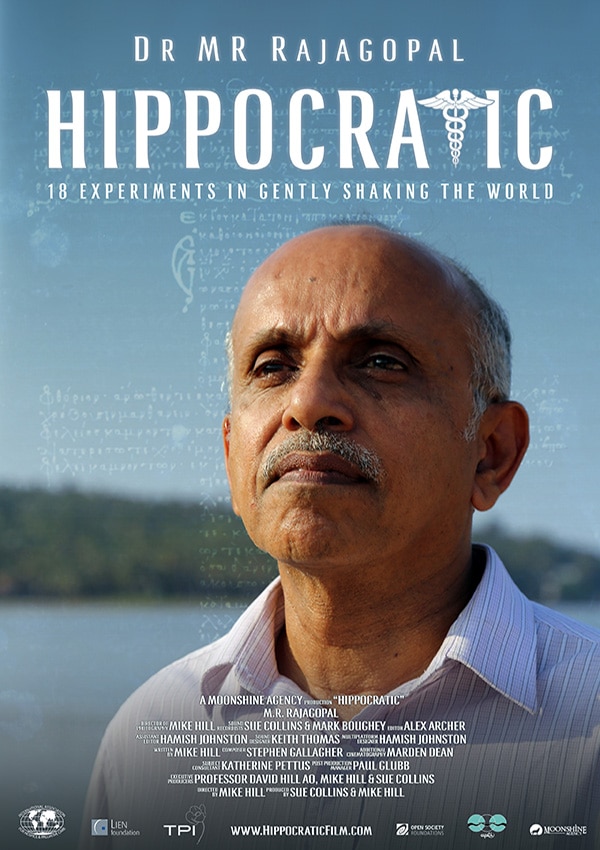OVERVIEW
Hippocratic Story inspired by the Hippocratic Oath – an ancient oath historically taken by physicians.
Dr Raj is a small man with a big dream: a pain-free India.
His mission is to bring ethical practice to modern medicine through whole person care and universal access to morphine – the essential, but heavily restricted, narcotic pain medicine.
Now, this spiritual leader of ethical medicine shares the story of his life’s work, reflecting on effecting change in a country of 1.2 billion people – where corruption is rife, bureaucracy is suffocating and the unregulated ‘medical industry’ is driving millions of vulnerable families into financial ruin every year.

HIPPOCRATIC STORY
The Hippocratic Oath is a solemn pledge taken by physicians inspired by ancient Greek medical texts. It articulates the key principles of ethical medicine…. and it has largely been forgotten by today’s medical graduates. “Some of you who are listening today are medical students or nursing students. You would have possibly taken a Hippocratic Oath – some of you would have taken it seriously. For some like me it was just a ritual, I was not touched by it because it seemed too idealistic and impractical. It was so contradictory to what I saw practiced around me.”
Professor MR Rajagopal, better known as ‘Dr Raj’, fell into medicine – a happy accident. He’s now one of the field’s most respected physicians, described by the New York Times as ‘the father of palliative care in India’ and the recipient of Human Rights Watch’s most revered endowment. Raj is also an outspoken critic of the modern medical industry. “One of the ills of the modern medical system is that is does not seem to understand what its purpose is. Hippocrates said that a doctor’s duty is to cure sometimes, treat often, and to comfort always. Unfortunately, all the effort nowadays is at curing. If cure is not possible, we keep on attacking the disease. Even in a patient with advanced cancer, or a person with stroke whose brain has been totally destroyed, shutting him up inside an intensive care unit, putting him on life support systems when he is trying to say farewell to the world – without the human touch, not able to see his relatives, not able to say goodbye to his son or grandchild, or his father or mother – that is a real tragedy.”
Hippocratic, a feature documentary film slated for global theatrical release in 2017, tells the remarkable life story of Dr Raj in an intimate, immersive and powerful first person account revealing how returning to the first principles of medical practice has the power to revolutionise the modern health care system.
TOPIC
The problem in India, as with most parts of the developing world, is that insufficient levels of Government expenditure are dedicated to health care. This means that health care is largely delivered by the private sector and clustered in metropolitan areas. This environment is ripe for exploitation by the medical industry, particularly in the context of developing countries were the industry goes about its business largely unregulated. The common consequence of this is that patients living near or below the official poverty line (21.9% of India’s population, or 276 million people earning less than US$1.25 per day) are unnecessarily prescribed expensive, patented medications that drive them into financial ruin.
For the 70% of the Indian population (around 900 million) access to government hospitals and health clinics is limited. This means that disease tends to advance to its late stages before patients present to doctors. For instance, around 80% of cancers once diagnosed, are incurable. To date, services treating advanced and terminal illnesses in India, like those pioneered by Raj, have largely developed from a grass-roots, community level. The opportunity is that State and National Governments now have an increasing role to play in enabling these essential services to be rolled out across the country as part of a broader push to strengthen the national health system.
Many patients with late stage disease, especially cancer, experience agonizing pain due to the strict regulation of medicinal opioids like oral morphine (which is classed by the World Health Organization as gold standard treatment of moderate to sever pain).


The reason for this is due to restrictive policies designed to curb the abuse of illicit narcotics. Despite the efforts of Raj and his colleagues to successfully change the regulations, implementation of the new policies in many parts of the country is yet to take place.
This film is timely now, because national policies have recently been changed facilitating the delivery to these essential medicines but if demand is too slow there is a risk that these draconian policies may be resurrected. The quality of life of millions of seriously ill Indians is at stake.
The parallel push to secure Raj’s nomination for the Nobel Peace Prize provides a secondary impetus for the mass media to embrace this story in India and beyond.
More broadly, there is an urgent need for health care professionals everywhere to return to the first principles of medicine. Health workers themselves are increasingly disenfranchised by the modern medical system. Evidence of this is shown in the regrettable statistic that physicians are more than twice as likely as the general population to kill themselves.
Raj reminds us of the importance of helping physicians remember their Hippocratic Oath and supporting the development of a more nurturing medical culture for patients and health professionals alike.
“If they find you to be a human being, and not just a white coated machine, then they react to us with smiles, maybe with jokes. That’s happiness, that transformation of people. Then you see such amazing strength in people, patients and family members.”
IMPACT
As its names suggests, Hippocratic seeks to remind physicians in training of the famous Oath that their predecessors have swore by for millennia. In modern times, with the emergence of the ‘medical industry’ and a culture of medical sub-specialization, the significance Hippocratic Oath has been eroded. This cultural shift presents a challenge for health systems and a threat for patients.
By reminding physicians about the fundamental principles of ethical medical practice, Hippocratic creates an opportunity to reflect on how the experiences of patients and their families are also being impacted (and in some cases destroyed) by this industrial and cultural shift. The Indian experience brings this in sharp focus and is the canary in the coal mine for the rest of the world. Equally, Raj’s example provides hope and an opportunity for future medical professionals to adopt the principles of ethical medicine from their first day of residency.


These champions of ethical medicine will generate a medical culture conducive to broader cultural change. The project aims to capture an audience of ethically aligned, early-stage physicians and steer them towards training opportunities in the related disciplines of pain management and palliative care.
It also seeks to engage the general public, both in India and throughout the English-speaking world. In the context of this story, the general public represent patients themselves – we’re all patients at some time or another after all. This empowers us to express opinions about our expectations of the care others and ourselves ought to receive. Our voices matter, both at home in India, and a shift in public consciousness towards ethical medicine will provide a foundation for industrial and societal change. This movement will be fortified by the engagement of civil society groups who mobilize behind the cause and the use of social media as a discussion platform.
Hippocratic aims to bring the western medical industry and governments to account for the practices that undermine the care of patients. By providing a solution for how better care can be delivered through affordable, ethical practice, the project can facilitate increased support for community health initiatives and more practical regulations for access to essential pain medicines. Hippocratic presents an opportunity for industry to develop new market opportunities in a more responsible way and invites governments to accept more responsibility in the care of seriously ill patients and the alleviation of their suffering.
In short, the project aims to:
– Bring back the Hippocratic Oath.
– Normalise ethical, whole-person care.
– Identify future champions of ethical medicine, pain management & palliative care.
– Create demand for oral morphine and other essential pain medicines in treating cancer pain and all other severe pain throughout India.
– Hold the medical industry and governments to account.
– Shift social and political consciousness creating an environment conducive for positive change.
– Give voice to those suffering needlessly.
– Support the cause.








